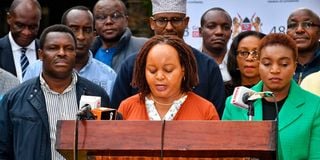Governors halt medical kits leasing project after talks

CoG chairperson Anne Waiguru addresses journalists after a consultative meeting between the national and county governments at the Great Rift Lodge, Naivasha on June 15, 2023. She is accompanied by Health CS Susan Nakhumicha (right), Governor Muthomi Njuki (left) and other county bosses.
The national and county governments have agreed to halt the contentious Managed Equipment Services (MES), following two days of deliberations in Naivasha.
Reading a communiqué at the end of the talks yesterday, Council of Governors (CoG) chairperson Anne Waiguru said they had resolved and agreed upon all pending issues on the scheme and related services deployed by the national government.
“Intergovernmental Participation Agreements (IPAs) to be executed between the Ministry of Health and individual county governments,” said Ms Waiguru.
The government had notified contractors of the termination of services and taking over the leased equipment as per the contracts signed before the machines were taken to at least two hospitals in the 47 devolved units.
“Today we have witnessed the death of the MES… We now have a new scheme called National Equipment Support to Counties…We have buried history on how MES was consumed…we are now on a new level where our interest is service to the people so long as the national government is providing the equipment,” said Tharaka-Nithi Governor Muthomi Njuki.
Mr Njuki said they had “done the right thing, hence the decision to sign the document, because we need the equipment irrespective of the model of engagement with the vendors. Counties are consumers.”
For her part, Health Cabinet Secretary Susan Nakhumicha termed the talks “ice-breaking”, adding that she was optimistic the “noise on MES was going to fizzle out”.
Heated debate
At the same time, sources said there was a heated debate on the proposed Community Health Promoters (CHP) programme, focusing on two key aspects — the payment model for the promoters and the procurement of medical kits.
Speaking in Naivasha on Wednesday, President William Ruto said the government would hire at least 100,000 CHPs in a move aimed at decentralising health services.
He said the promoters would be responsible for providing care to about 100 households within their assigned wards, adding that the programme’s objective was to improve healthcare services for the underprivileged population.
At the meeting, Ms Waiguru said the two levels of government would jointly facilitate the payment of stipends to CHPs.
“Additionally, the community promoters will be provided with a kit that will enhance medical response at the community level,” she said.
She said the two levels of government also agreed that the Ministry of Health would replenish the kits after every three years. The governors had expressed concern that the national government might assume control of the CHP programme, potentially excluding the involvement of the counties despite the fact that healthcare is a devolved function.




